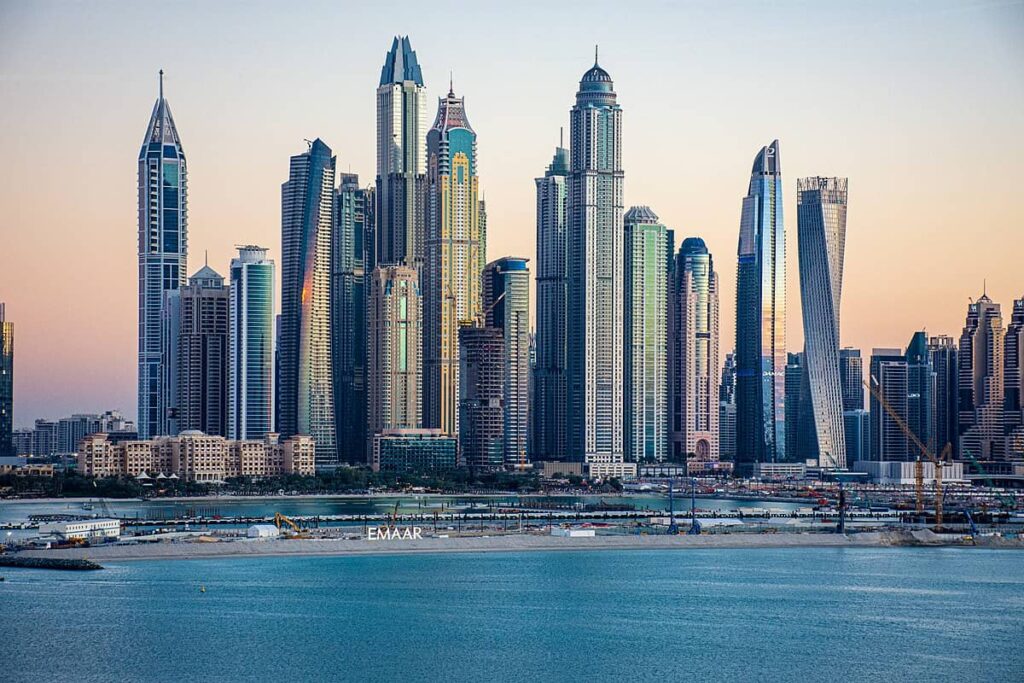The third quarter of this year saw good trends in the residential, office, retail, and hospitality sectors of the UAE’s real estate market, according to a renowned real estate expert JLL.
According to JLL’s most recent UAE Real Estate Market Report, overall residential prices in Dubai surged by 9% year over year in Q3 while average rental rates increased by 25%. Both sales and rentals were supported by greater demand and increased buyer activity.
While average rentals increased by 2% annually, sale prices in the capital increased by 4%.
According to the report, there is a rising demand for new construction in investment zones in Abu Dhabi, particularly for townhouses and villas.
Investor and end-user demand are causing prices to rise throughout the UAE. According to JLL’s analysis, off-plan sales are rising and secondary market sales are also growing as a result of rising yields.
According to the quarterly report, around 6,600 residential units were handed over in Dubai in Q3, bringing the city’s total stock to 672,000 units. Another 20,000 units are expected to be finished by year’s end.
In Abu Dhabi, over 1,900 units were delivered in the third quarter, bringing the total number of homes in the Emirate to about 278,000 units. According to the research, the capital projects 2,000 additional units, largely in master-planned communities, to be finished by year’s end.
Khawar Khan, the Head of Research at Middle East, Africa, and Turkey at JLL, said: “End-users using mortgage finance to purchase properties have been rushing to lock in fixed rates in an environment where both interest rates and rents are rising quickly. Indeed, Reidin’s citywide residential rent index showed annual growth of 25% in August.”
“Price growth is also being fueled by investor demand. This category has been returning to the off-plan market in force, while sales in the secondary market have also picked up in view of the upward trajectory of yields,” noted Khan.
Regarding the office market, JLL reported that Dubai’s Central Business District (CBD) rents increased by 24% year over year in Q3, as a result of the city’s persistent shortage of high-quality stock and the absence of any new office completions.
By year’s end, the emirate plans to add 53,000 square meters of office space that will be available for transfer. The majority of the city’s office space is currently nearly full, and the office vacancy rate is only 13%—down about 8% points from a year ago.
Dubai’s Grade A CBD rents averaged AED2,084 per square meter per year during the third quarter, while Abu Dhabi saw a 9% year-over-year increase to AED 1,750 per square meter per year.
The majority of inquiries in Q3 were for co-working and serviced offices, despite Abu Dhabi having added 63,000 sq m of additional office space to its inventory since Q2, demonstrating that the new post-pandemic hybrid working patterns are here to stay. The pipeline for Abu Dhabi’s fourth quarter does not include any new office stock, it said.
According to the report, the capital’s Grade A and B office space vacancy rate decreased by 3% during the previous three months.
Regarding the retail situation, JLL stated that while no new retail projects were finished in either Dubai or Abu Dhabi during the third quarter, the sector was set to welcome around 154,000 sq m of new retail space in Dubai and 197,000 sq m in the capital during the fourth quarter.
Potential tenants are being more strategic in choosing their locations for new stores because there is a plentiful supply for merchants to pick from.
According to the sector expert, a slight rise in retail rents (3% in Dubai and 5% in Abu Dhabi) represents a sector that is profiting from rising consumer confidence.
While the loosening of limitations is assisting in the recovery of foot traffic, mall owners are seeing the value of differentiating their goods in a market with a plentiful supply. Malls are implementing more immersive retail concepts and aiming to provide visitors to their premises with a wider range of outlets in response to increased competition, it was said.
More homegrown concepts are expected to be sought after by developers and landlords, especially in the F&B sector, since they have the attractiveness of providing experiences catered to regional needs while still being reasonably adaptable.
